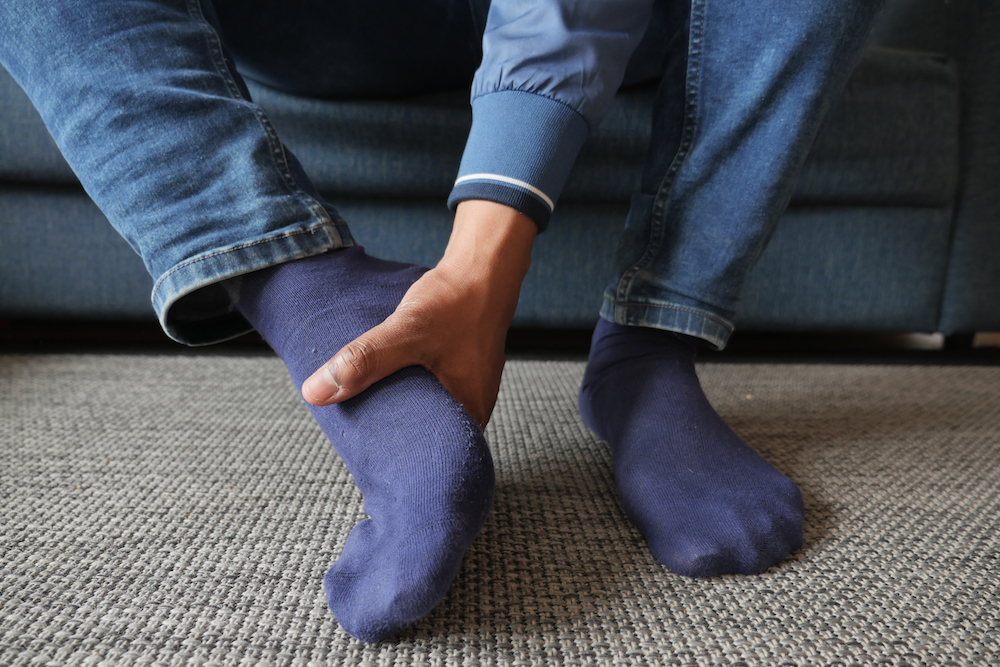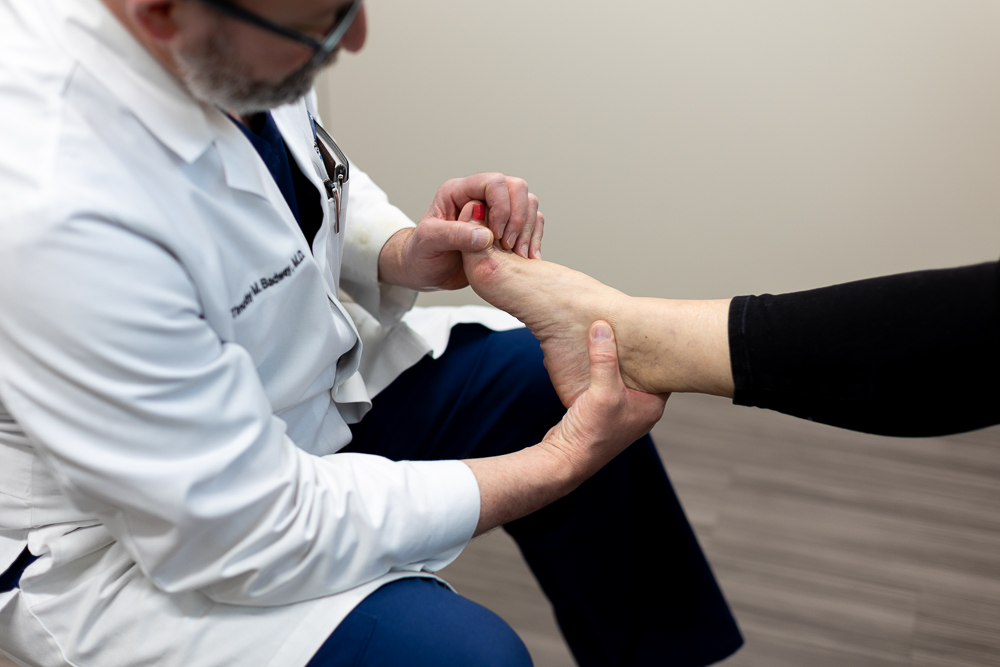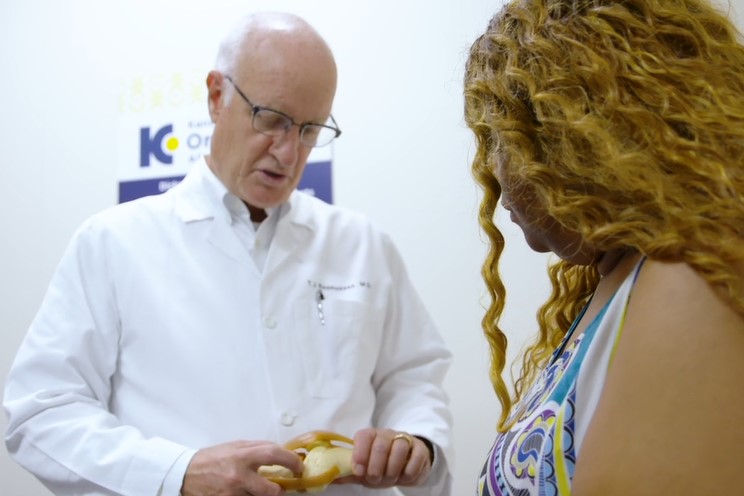
Foot pain, regardless of its cause, can significantly hinder your ability to walk, work, move, and participate in the activities you love. If this sounds familiar and foot pain is holding you back, it’s crucial to find a treatment that can help.
Plantar fasciitis is one of the most common reasons people experience foot pain. It’s estimated that this condition affects about 2 million people in the US alone. At Kansas City Orthopedic Alliance, we routinely treat plantar fasciitis and help patients return to a pain-free life.
Kansas City Orthopedic Alliance is the Midwest’s premier provider of orthopedic care. As the largest orthopedic practice in Kansas City, we treat thousands of patients each year across our 5 locations: Overland Park, Leawood, Belton, Kansas City, and Blue Springs. Using the latest technology, our physicians can evaluate, diagnose, and treat nearly any type of musculoskeletal pain.
If you are ready to treat your plantar fasciitis right now, schedule an appointment with a qualified orthopedic provider or keep reading to learn more about plantar fasciitis treatment in Kansas City.
Understanding Plantar Fasciitis
Most adults will experience plantar fasciitis at some point in their lives, but what causes this painful condition to develop in the first place? To better understand plantar fasciitis and why it affects your life, let’s first review the basic structure of the foot.
Anatomy of the Foot
There are several structures that play a role in plantar fasciitis:
Plantar Fascia
The plantar fascia is a long, thick band of tissue that runs along the bottom of your foot. It sits directly underneath your skin and connects the heel bone to the base of your toes. The plantar fascia plays an important role in arch support, stability, and shock absorption.
For patients with plantar fasciitis, this band of tissue becomes irritated and inflamed. When the plantar fascia is inflamed, it can cause significant pain in the heel of your foot.
Calcaneus
The calcaneus (or heel bone) is the largest of the seven bones in your foot. It plays a vital role in supporting your body weight, and it is where the plantar fascia attaches.
When the plantar fascia is irritated and unable to act as a shock absorber, the calcaneus bears a significant portion of the body’s weight. This, along with the inflammation, can cause sharp pain in the heel of the foot.
Achilles Tendon
The Achilles tendon is a band of tissue in the back of your ankle that connects the calf muscles to the heel bone. It is an important structure for many foot and ankle movements. While the Achilles tendon is not directly involved in plantar fasciitis, it is often a structure that suffers as a result of plantar fasciitis.
Related: Achilles Tendonitis Treatment in Kansas City
Symptoms of Plantar Fasciitis
The symptoms of plantar fasciitis can vary depending on its severity and the unique anatomy of your foot, but the most common symptoms we see in the clinic include:
- Pain in the heel of the foot when walking or running
- Pain along the arch of the foot when walking or running
- Stiffness and reduced flexibility in the foot (especially in the morning)
- Pain and tightness in the Achilles tendon
- Swelling and warmth in the heel
- Tenderness around the base of the heel
- Pain that may improve with activity, but is more severe in the morning or after rest
If you are experiencing any of the above symptoms, it could be a sign that you need plantar fasciitis treatment in Kansas City. When you schedule an appointment at KCOA, we will complete a thorough evaluation of your injury and discuss your symptoms in depth.
Plantar Fasciitis & Age
Plantar fasciitis primarily affects adults. Most patients only experience pain in one foot, but it’s possible for the condition to affect both feet. If a younger person has plantar fasciitis in both feet for an extended period of time, it could be a sign of another medical condition (such as rheumatoid or psoriatic arthritis).
If your child is experiencing plantar fasciitis in both feet, it’s important to seek evaluation and treatment as there are other conditions that can cause heel pain in children as well.
Causes of Plantar Fasciitis
The cause of plantar fasciitis isn’t fully understood, but individuals at a higher risk for this condition include:
- People with jobs that require prolonged standing or walking
- People who sit for most of the day and then have a sudden change in activity
- People who are overweight or obese
- People who have flat feet or high arches
- People who have a tight Achilles tendon
- People who wear shoes with poor arch support
- People who wear workbooks or cowboy boots with a heel (which causes the calves to be shortened)
Plantar Fasciitis Treatments
Plantar fasciitis is usually treated with non-surgical measures. At KCOA, we often recommend patients try at-home and in-clinic treatments to manage their pain.
At-Home Remedies
If you have foot pain from plantar fasciitis, an at-home plantar fasciitis treatment in Kansas City may help alleviate your pain and improve your function. We like to start patients with the following treatments:
Ice
Ice is a great tool to reduce inflammation of the plantar fascia. You can take a Dixie cup and fill it 3/4ths of the way full with water, and then freeze it. Once frozen, you can peel off the top of the cup and rub the ice into the inflamed area. Alternatively, you can roll your foot on a frozen water bottle for pain relief as well.
Aim to complete this 2 to 3 times per day, and avoid icing for more than 10 minutes at a time.
Stretches
Stretching is crucial for patients with plantar fasciitis. We recommend patients stretch first thing in the morning, before you get out of bed. You’ll want to keep a towel within arm’s reach and complete your calf stretches before even stepping out of bed.
Over-the-Counter Medications
Over-the-counter nonsteroidal anti-inflammatory drugs can help reduce pain and swelling from plantar fasciitis. Be sure to talk to your doctor before starting any new medications (even if they are over-the-counter).
Night Splints
Night splints are devices that keep your foot in a neutral position while you sleep. This helps stretch the plantar fascia and Achilles tendon while you rest to relieve morning stiffness and pain. There are several types of night splints, and your healthcare provider can recommend the one that will best suit your particular needs.
In-Clinic Treatments
If at-home treatments don’t offer the pain relief you need, we have several treatments at our clinic that are designed to promote healing and ease your pain.
Physical Therapy
Physical therapy can increase the flexibility and strength of your foot. Your KCOA provider can write a prescription for physical therapy to target the calf muscles, Achilles tendon, plantar fascia, or other supportive muscles to reduce strain on the plantar fascia.
Physical therapists can also analyze your walking patterns and determine if any modifications to your footwear or walking/running technique are necessary.
Orthotics
Orthotic insoles provide arch support, shock absorption, and reduce the pressure on your heel. If your provider thinks you could benefit from an orthotic, we will write a prescription for the type of orthotic you need and help you find the most cost-effective option.
Prescription Pain Medication
Sometimes, prescription pain medication can alleviate the inflammation better than over-the-counter medications. If needed, your provider can prescribe medications as part of your plantar fasciitis treatment in Kansas City.
Cortisone Injections
Steroid injections can provide relief from pain and swelling for a significant period of time (up to 6 months). It’s generally recommended that these injections be used sparingly because side effects from overuse could be detrimental.
PRP Injections
PRP (platelet-rich plasma) injections are a regenerative medicine treatment that uses your body’s own resources to promote healing. Using a high concentration of platelets from your own blood, PRP injections can alleviate pain while promoting cellular growth in the treatment area.
Tenex Treatment
Tenex is an advanced, minimally invasive tendon procedure. During this minimally invasive procedure, a needle is used to remove damaged tissue from the foot.
Surgical Treatment
In most cases, surgical treatment is not necessary for plantar fasciitis. However, in severe cases when non-surgical treatments don’t provide sufficient relief, surgical treatments are an option.

If you decide to pursue surgery, our highly experienced foot and ankle surgeons will walk you through every step of the process.
Visit Kansas City Orthopedic Alliance for Plantar Fasciitis Treatment in Kansas City
At Kansas City Orthopedic Alliance, we’re dedicated to creating a superior patient experience for all. Whether you’re having back pain or need sprained ankle treatment in Kansas City, we have skilled providers who can help.
We’ve helped thousands of patients treat their pain, restore their function, and improve their quality of life.
For a thorough evaluation, call us at (913) 319-7600 or schedule an appointment today. If you’re struggling with shoulder pain but don’t know where to start, use our symptom tracker for treatment recommendations.


